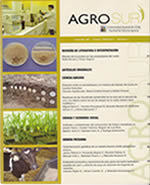Characterization of composting of Canary island date palm waste in Mexico City
Main Article Content
Abstract
The biggest problem facing Mexico City is the huge amount of organic waste it produces daily, which has recently increased with the decline and death of hundreds of Canary Island palms. As an alternative to reduce this, there is composting, a process whose final product, compost, must guarantee safety for plants and humans. The objective of the study was to determine the maturity of Canary Island date palm (Phoenix canariensis L.) compost through phytotoxicity tests and other physical and chemical parameters. During the composting process, five sampling were performed, and phytotoxicity bioassays were carried out with lettuce seeds in aqueous extracts of the compost, and the Germination Index (GI) was determined. At the beginning and at the end of the process, the physical and chemical analyses indicated by the Mexican Composting Standard 2018 (NMC) were accomplish. There was an increase in germination from 39% in May to 96% in September, the same occurred with the GI value. After 124 days of composting, the product reached maturity and stability, i.e., free of phytotoxicity, reaching a GI of 135.1 and adequate organoleptic properties. 89.7% of the compost volume had Type 1 quality (particle size ≤10 mm), free of impurities, heavy metals and pathogens. Except for the C/N ratio, and percentage of P and K, the rest of the parameters were within the limits reported in the NMC. This research explores for the first time the composting of P. canariensis waste in Mexico.
Article Details

This work is licensed under a Creative Commons Attribution-NonCommercial 4.0 International License.

